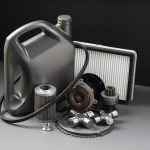Understanding the Causes of Gasket Failure in Your Car

Gaskets play a crucial role in the overall functioning of your car, sealing the gaps between various engine components and preventing the escape of fluids and gases. A gasket failure can lead to many issues, from minor leaks to catastrophic engine damage. Understanding the causes of gasket failure can help you prevent costly repairs and maintain the health of your vehicle. In this blog post, we’ll delve into the common causes of gasket failure, the signs to watch for, and preventive measures to keep your car running smoothly.
1. Poor Installation
One of the leading causes of gasket failure is improper installation. This can occur due to:
- Incorrect Torque Application: Over-tightening or under-tightening the bolts can distort the gasket, leading to uneven pressure distribution and eventual failure.
- Gasket Misalignment: If the gasket is not properly aligned during installation, it may not seal correctly, leading to leaks.
- Dirty Surfaces: Installation on dirty or uneven surfaces can prevent the gasket from sealing properly.
2. Material Degradation
Gaskets are made from various materials, including rubber, silicone, and composite materials. Over time, these materials can degrade due to:
- Heat Exposure: Constant exposure to high temperatures can cause gaskets to harden, crack, or shrink, compromising their sealing ability.
- Chemical Exposure: Contact with oils, coolants, and other chemicals can cause the gasket material to break down.
- Aging: Like any component, gaskets have a finite lifespan and can naturally wear out over time.
3. Thermal Cycling
The repeated heating and cooling cycles of an engine cause expansion and contraction of components. This thermal cycling can:
- Loosen Fasteners: The continuous expansion and contraction can loosen bolts, reducing the pressure on the gasket.
- Cause Material Fatigue: Repeated cycles can lead to material fatigue, making the gasket brittle and prone to cracking.
4. Mechanical Stress
Mechanical stress on the gasket can result from:
- Improper Engine Assembly: If components are not assembled correctly, it can put undue stress on the gasket.
- Vibration: Excessive engine vibration can lead to gasket displacement and eventual failure.
5. Design Flaws
Sometimes, gasket failure can be attributed to inherent design flaws in the engine or gasket itself. This can include:
- Poor Gasket Design: Some gaskets may be poorly designed, unable to withstand the pressures and temperatures they are exposed to.
- Inadequate Sealing Surface: The mating surfaces may not provide a sufficient area for the gasket to seal properly.
Signs of Gasket Failure
Recognizing the signs of gasket failure early can save you from significant damage and repair costs. Some common signs include:
- Fluid Leaks: Visible oil or coolant leaks under the car can indicate a failed gasket.
- Overheating: If the head gasket fails, it can lead to engine overheating.
- White Smoke from Exhaust: A blown head gasket can cause coolant to enter the combustion chamber, producing white smoke.
- Loss of Power: A failing gasket can lead to a drop in engine performance.
- Milky Oil: Coolant mixing with oil due to a gasket failure can create a milky substance.
Preventive Measures
To minimize the risk of gasket failure, consider the following preventive measures:
- Regular Maintenance: Routine inspections and maintenance can help identify potential gasket issues before they become serious.
- Proper Installation: Ensure gaskets are installed correctly, using the proper torque specifications and clean surfaces.
- Use Quality Gaskets: Invest in high-quality gaskets designed for your specific vehicle.
- Monitor Engine Temperature: Keep an eye on your engine’s temperature to avoid overheating, which can damage gaskets.
- Replace Aging Gaskets: Proactively replace gaskets that show signs of wear or are nearing the end of their lifespan.
Gasket failure can be a serious issue for your vehicle, leading to leaks, overheating, and potential engine damage. By understanding the causes and taking preventive measures, you can help ensure your car runs smoothly and avoid costly repairs. Regular maintenance and attention to detail during installations are key to extending the life of your gaskets and maintaining your vehicle’s performance.
Image Credit: Image by FreePik







